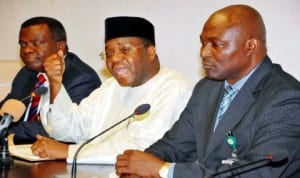Business
FG Invests N32bn In FTZ

Permanent Secretary, Ministry of Power, Amb. Godknows Igali (middle), briefing newsmen after a preparatory meeting to strategise on the scheduled handover of PHCN Successor Companies at the Presidential Villa in Abuja, recently. With him are Director-General, Budget Office, Mr Bright Okongwu (left) and Director-General, BPE, Mr Benjamin Dikki.
The Minister of Industry,
Trade and Investment, Dr Olusegun Aganga, says 200 million dollars (N32 billion) has been invested in Onne Oil and Gas Free Trade Zones (FTZ).
Aganga, who stated this at an oil and gas trade and investment forum in Onne, Port-Harcourt on Thursday said that the above investment figure was for the last 10 months.
He said that if the figure was added to the four billion dollars capital investment reported in 2012, the latest figure would amount to 4.2 billion dollars (N672 billion).
The forum was organised by Orlean Invest West Africa Ltd. in partnership with the Federal Government.
The theme of the forum was “Investment Opportunities in the Upstream and Downstream Sectors of the Oil and Gas Industry”.
Aganga described the total investment portfolio as a remarkable progress when considered from the standpoint of weak global economy and the huge competition among advanced economies.
He said that the success of the policy on FTZ had increased the demand at the sub-national level of government for a replication of free zones in other parts of the country.
“The Onne Oil and Gas Zone remains a pacesetter, with additional investment of 200 million dollars in 2013, in addition to the four billion dollars capital investments reported in 2012.
“This is indeed a remarkable progress when considered in the light of a weak global economy and the cut-throat competition, even among emerging and advanced economies for inflow foreign direct investment.
“The success of our FTZ policy has invariably increased the demand at the sub-national level of government for replication of free zones in other parts of the country.
“Also an avalanche of applications for setting up business enterprises in the various FTZs keep pouring in from prospective investors,” Aganga said.
The minister said that the genuineness and sincerity of purpose of government to enthrone the private sector as the main driver of growth and development of the nation’s economy was not in doubt.
He said that the theme of the forum, which was the second edition, would not only consolidate the gains achieved in the first edition but would also help to deepen investments in the sector.
“To all intent, the Oil and Gas Industry remains the prime mover of Nigeria’s economy.
“The oil and gas free zone concept continues to be strategic in the facilitation of private sector investments in the sector in line with the nation’s industrial policy,’’ he added.
Given the role of the private sector in driving the national economy toward sustainable development, the minister urged investors to explore the available incentive packages offered by the free trade zones.
He said that the Onne Oil and Gas FTZs would continue to be a catalyst for diversification of the economy into services and downstream sector.
The minister said that Nigeria’s oil and gas zone was the single largest and fastest growing oil and gas free zone in the world.
“Indeed, our national aspiration is to be the petrochemical hub in Africa,’’ he said.
The Minister of Petroleum Resources, Mrs Diezani Alison-Madueke, said that the sector offered a global scale of opportunities for both local and foreign investors.
Alison-Madueke said that the Federal Government would continue to provide enabling environment for investments to thrive.
Business
Nigeria’s ETF correction deepens as STANBICETF30, VETGRIF30 see 50% decline in a week

Business
BOI Introduces Business Clinic

Business
Dangote signs $400 mln equipment deal with China’s XCMG to speed up refinery expansion

-
Maritime2 days ago
Nigeria To Pilot Regional Fishing Vessels Register In Gulf Of Guinea —Oyetola
-
Maritime2 days ago
Customs Declares War Against Narcotics Baron At Idiroko Border
-

 Sports2 days ago
Sports2 days agoGombe-Gara Rejects Chelle $130,000 monthly salary
-
Maritime2 days ago
NIMASA,NAF Boost Unmanned Aerial Surveillance For Maritime Security
-
Maritime2 days ago
NIWA Collaborates ICPC TO Strengthen Integrity, Revenue
-

 Sports2 days ago
Sports2 days agoTEAM RIVERS SET TO WIN 4×400 ” MORROW” …Wins Triple jump Silver
-

 Sports2 days ago
Sports2 days agoNPFL Drops To 91st In Global League Rankings
-

 Sports2 days ago
Sports2 days agoNSC eyes international hosting rights

